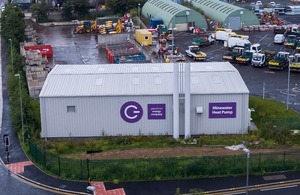Mine water heat – a proven success
Mine water heat experts highlight the potential of mine water heat 6 months since the nation's first large-scale scheme in Gateshead started operating.

The mine water heat pump building at Gateshead.
Coal Authority mine water heat experts say there are great opportunities for coalfield communities to help achieve net zero after the nation’s first large-scale network was hailed a success, 6 months on since it started operating.
It took just 3 years for the groundbreaking energy project in Gateshead to go from first concept meeting to full operation on 29 March 2023. It is now one of the largest in Europe and has been providing hot water and heat to hundreds of homes and businesses for 6 months now. It uses existing technology to supply secure, stable-priced heat, replacing the gas engines that used to heat the network.
This is a major step forward in the mission to decarbonise heat and a real-world example of how former mining communities could benefit from using the historical industrial coal mining infrastructure to create an eco-friendly future.
The innovative project is helping to combat climate change and achieve net zero targets by tapping into the potential of water-filled, disused coal workings underground. It harnesses geothermal energy from mine water to generate localised, secure, low-carbon heat, replacing the function of traditional boiler systems.
The council-owned Gateshead Energy Company project demonstrates how similar networks could benefit other coalfield communities across Great Britain. With billions of tonnes of coal extracted from British mines over the past 3 centuries, a wealth of information on mine workings exists. Many of our largest towns and cities grew due to their former coal reserves, leaving a good match between areas of heat demand and areas of disused mines.
In addition to providing its own funding, Gateshead Council was awarded £5.9m of Heat Networks Investment Project funding, which was used to install 5km of new heat network pipes, boreholes and a heat pump energy centre capable of producing 6 mega-watts of mine water heat.
This now provides secure, low-carbon heating to 350 high-rise homes, the Glasshouse (formerly Sage Gateshead), Gateshead College, the Baltic Centre for Contemporary Art and several office buildings. A large manufacturing site was also recently connected to the network. Future additions will include 270 private homes, a new conference centre and a hotel development.
A whole host of organisations were involved in the project, from both public and private sectors, bringing together the expertise of key stakeholders, including government bodies, local authorities and energy industry leaders.
Work on the underground mines required for the scheme was supported by the Coal Authority, which owns and manages the disused coal-mining infrastructure on behalf of the UK government.
The Coal Authority along with key partners, such as the British Geological Survey, have been researching the potential for recovering low-carbon heat from disused coal mining infrastructure for several years. The organisations have built up a wealth of expertise during this time. Coal Authority dedicated specialists used this knowledge to advise and facilitate on the Gateshead project. The organisation is now working with other local authorities and key partners across England, Scotland and Wales to unlock the full potential of our mine heat resource.
Councillor John McElroy, cabinet member for the environment and transport at Gateshead Council, said:
What we have in Gateshead is a legacy from the days of the coal mines, which was dirty energy. Now we are leading the way in generating clean, green energy from those mines.
Adding mine water to our heat network is a huge achievement on our zero carbon heat journey.
We are showing what is possible when you invest in this technology.
Richard Bond, innovation and engagement director at the Coal Authority, said:
We are proud to have been part of this revolutionary project working closely with Gateshead Council, which has led the way in providing a real working example of mine water heat, paving the way for other local authorities and organisations to create similar schemes.
We believe this is a huge opportunity for Britain that can play a key part in meeting ambitious emissions reduction targets, and it’s encouraging to know that these communities, which had such a big role in our industrial past, will be an important part of a greener future.